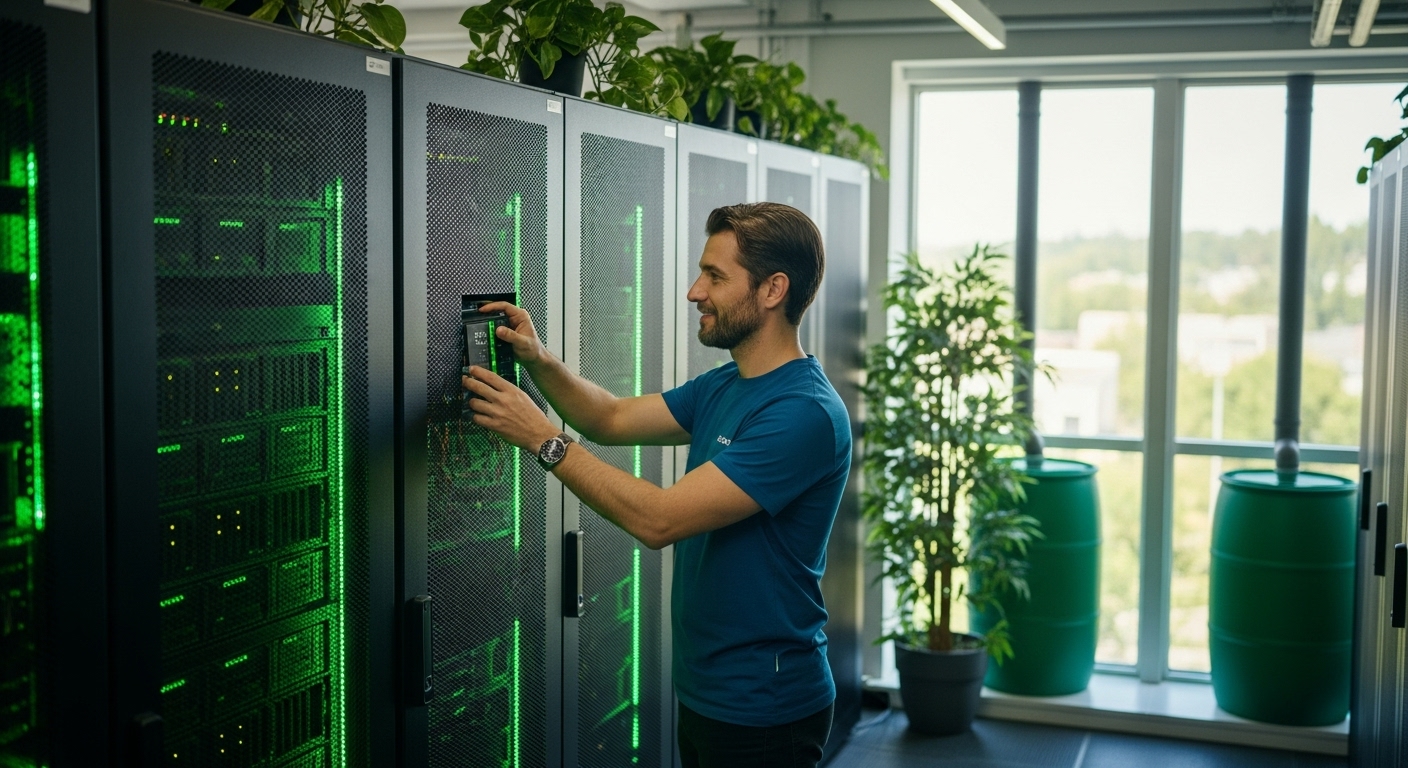Eco-friendly web hosting is quietly transforming how the internet works, putting massive focus on environmental sustainability. It sounds almost unbelievable, but research shows that internet technologies generate roughly 50% more carbon dioxide than global aviation each year. Green web hosting is not just for tree-huggers and eco-warriors, it is quickly becoming the smart move for any business that wants to stay ahead in both technology and responsibility.
Table of Contents
- What Is Eco-Friendly Web Hosting?
- The Importance Of Sustainable Hosting Solutions
- How Eco-Friendly Web Hosting Works
- Key Concepts Behind Eco-Friendly Hosting
Quick Summary
| Takeaway | Explanation |
|---|---|
| Eco-friendly hosting reduces carbon emissions | Traditional web hosting generates significant carbon, while green hosting uses renewable energy sources to minimise impact. |
| Lower operational costs through energy efficiency | Businesses adopting green technologies can significantly cut energy costs while achieving sustainability goals. |
| Enhance brand reputation with sustainable practices | Companies that utilise eco-friendly hosting appeal to environmentally conscious consumers and improve their public image. |
| Future-proof infrastructure against regulations | Establishing green hosting strategies prepares businesses for stringent future carbon regulations, ensuring competitiveness. |
| Maximise performance through technological innovations | Eco-friendly hosting employs advanced techniques to optimise energy use without compromising service quality or performance. |
What is Eco-Friendly Web Hosting?
Eco-friendly web hosting represents an innovative approach to digital infrastructure that prioritises environmental sustainability within the technology sector. Unlike traditional web hosting models that consume significant electrical power and generate substantial carbon emissions, green web hosting focuses on minimising the environmental impact of digital services.
Understanding the Environmental Impact of Web Hosting
Web hosting involves complex computational systems that require continuous power to maintain server infrastructure. Research from The Green Web Foundation reveals that internet technologies generate approximately 50% more carbon dioxide compared to global aviation, highlighting the urgent need for sustainable digital practices.
Key characteristics of eco-friendly web hosting include:
- Utilising renewable energy sources like solar and wind power for data centre operations
- Implementing energy-efficient server technologies
- Reducing overall carbon footprint through strategic infrastructure design
- Minimising electronic waste through responsible hardware management
How Green Web Hosting Works
Green web hosting providers transform traditional data centre operations by integrating sustainable practices. These organisations invest in renewable energy infrastructure, purchase carbon offsets, and design computational systems that maximise energy efficiency.
Businesses can explore sustainable web development strategies that complement eco-friendly hosting, creating a holistic approach to digital sustainability. By selecting green hosting solutions, companies demonstrate environmental responsibility while maintaining robust digital infrastructure.
The transition to eco-friendly web hosting represents more than an environmental choice it is a strategic business decision that aligns technological needs with global sustainability objectives. As digital technologies continue expanding, green hosting provides a responsible pathway for organisations seeking to reduce their technological carbon footprint.
The Importance of Sustainable Hosting Solutions
Sustainable hosting solutions represent a critical strategic investment for modern businesses seeking to align technological infrastructure with environmental responsibility and long-term operational efficiency. As digital technologies continue expanding, the environmental impact of web infrastructure becomes increasingly significant.
Environmental and Business Performance Advantages
Research from Sustainable Web Design Institute demonstrates that sustainable hosting provides multifaceted benefits beyond environmental conservation. Companies adopting green hosting solutions can achieve substantial operational advantages that extend far beyond traditional carbon reduction strategies.
Key performance advantages include:
- Reduced operational energy costs
- Enhanced corporate sustainability credentials
- Improved brand reputation among environmentally conscious consumers
- Long-term infrastructure resilience
Strategic Implications for Digital Infrastructure
Businesses are recognising that sustainable hosting is not merely an environmental choice but a sophisticated technological strategy. By exploring comprehensive web hosting approaches, organisations can create digital infrastructures that are both technologically robust and environmentally responsible.
The economic landscape is rapidly evolving, with investors and stakeholders increasingly scrutinising companies’ environmental commitments. Sustainable hosting solutions offer a tangible demonstration of corporate environmental stewardship, potentially unlocking competitive advantages in market positioning and brand perception.
Moreover, sustainable hosting technologies represent an investment in future-proofing digital infrastructure. As global regulations around carbon emissions become more stringent, businesses with established green hosting strategies will be better positioned to adapt and thrive in an increasingly environmentally conscious global economy.
How Eco-Friendly Web Hosting Works
Eco-friendly web hosting transforms traditional digital infrastructure by integrating advanced technologies and sustainable practices that minimise environmental impact while maintaining high-performance computational capabilities. This approach fundamentally reimagines how data centres and web services consume and manage energy resources.
Renewable Energy Infrastructure
Research from World Economic Forum highlights that sustainable web hosting relies on strategic energy sourcing and innovative technological solutions. Green hosting providers prioritise renewable energy sources such as solar, wind, and hydroelectric power to drive their data centre operations.
![]()
Key technological strategies include:
Below is a table summarising the main technological strategies used by eco-friendly web hosting providers to achieve sustainability, as described in the article.
| Strategy | Description |
|---|---|
| Utilising 100% renewable energy | Powering data centres entirely with renewable sources like solar, wind, or hydroelectric energy. |
| Advanced cooling technologies | Implementing efficient cooling systems to reduce energy consumption in server environments. |
| Modular server architectures | Designing servers in a modular way for maximum energy efficiency and scalability. |
| Carbon offset programmes | Investing in carbon offsets to neutralise any remaining emissions from their operations. |
| Dynamic power management | Adjusting server power usage in real-time based on computational demand. |
| Virtualisation techniques | Running multiple virtual servers on one physical machine to minimise hardware and energy usage. |
| Real-time energy monitoring | Continuously tracking and optimising energy consumption across infrastructure. |
- Utilising 100% renewable energy contracts
- Implementing advanced cooling technologies that reduce energy consumption
- Designing modular server architectures for maximum energy efficiency
- Investing in carbon offset programmes to neutralise remaining emissions
Computational Efficiency and Carbon Reduction
Green hosting providers employ sophisticated techniques to maximise computational efficiency while minimising environmental impact. By understanding modern web hosting infrastructure, organisations can appreciate the complex technological interventions that enable sustainable digital services.
These providers typically use advanced server technologies that dynamically adjust power consumption based on computational demand. Virtualisation techniques allow multiple virtual servers to operate on a single physical machine, significantly reducing hardware requirements and associated energy consumption.
Moreover, eco-friendly hosting involves continuous monitoring and optimisation of energy usage. Intelligent systems track power consumption in real-time, enabling immediate adjustments that maintain performance while minimising unnecessary energy expenditure. This approach represents a holistic method of creating environmentally responsible digital infrastructure that does not compromise on technological capabilities.

Key Concepts Behind Eco-Friendly Hosting
Eco-friendly hosting represents a sophisticated approach to digital infrastructure that integrates environmental consciousness with cutting-edge technological strategies. By reimagining traditional web hosting models, organisations can create digital solutions that balance performance, efficiency, and sustainability.
Core Principles of Sustainable Digital Infrastructure
Research from Sustainable Web Design reveals that eco-friendly hosting is founded on comprehensive principles that extend beyond simple energy reduction. These principles transform how businesses conceptualise and implement their digital technologies.
Fundamental principles include:
- Minimising computational waste through intelligent resource allocation
- Prioritising renewable energy sources for digital infrastructure
- Designing energy-efficient hardware and software architectures
- Implementing continuous performance and sustainability monitoring
Technological Frameworks for Green Hosting
By exploring comprehensive web hosting strategies, businesses can understand the intricate technological frameworks that enable sustainable digital services. Green hosting involves sophisticated approaches that go beyond traditional energy management.
Advanced hosting providers develop comprehensive ecosystems that integrate multiple sustainability strategies. These include intelligent workload distribution, dynamic power management, and advanced cooling technologies that significantly reduce energy consumption. The goal is not just to reduce carbon emissions but to create a holistic approach to digital infrastructure that considers environmental impact at every technological layer.
Moreover, eco-friendly hosting represents a paradigm shift in how organisations perceive digital technologies. It transforms web hosting from a purely functional service to a strategic decision that reflects corporate values, technological innovation, and environmental responsibility. By adopting these principles, businesses can demonstrate leadership in creating a more sustainable digital future.
Ready to Align Your Digital Presence with Sustainable Hosting?
Modern businesses face a growing challenge: how to maintain high-performance digital infrastructure while embracing eco-friendly values. As explored in this article, traditional web hosting can make it tough to reduce your company’s carbon footprint and meet today’s environmental standards. If you are searching for solutions that combine renewable energy practices, energy-efficient server technology, and holistic digital sustainability, you are not alone.
Cloud Fusion specialises in sustainable digital transformation. Our team develops custom websites and cloud solutions that leverage green web hosting, giving your business both the reliability and environmental responsibility your brand deserves. Experience cutting-edge design and hosting tailored for the forward-thinking South African market. Take the next step towards a cleaner digital future and request your custom web development and hosting quotation today. See how sustainable innovation can power your growth, or browse our full range of web development solutions to learn more. For personal guidance and a sustainable, scalable solution built around your industry, visit our main site at Cloud Fusion now.
Frequently Asked Questions
What is eco-friendly web hosting?
Eco-friendly web hosting is a digital infrastructure approach that prioritises environmental sustainability by utilising renewable energy sources, implementing energy-efficient technologies, and minimising carbon emissions.
How does green web hosting benefit my business?
Green web hosting not only reduces your environmental footprint but can also lower operational energy costs, improve brand reputation, and enhance corporate sustainability credentials among environmentally conscious consumers.
What technologies do eco-friendly web hosting providers use?
Eco-friendly hosting providers employ technologies such as 100% renewable energy contracts, advanced cooling systems, modular server architectures, and real-time energy monitoring to maximise efficiency and minimise environmental impact.
Why is sustainable hosting important for the digital economy?
Sustainable hosting solutions are crucial as they demonstrate corporate environmental stewardship, help businesses adapt to stringent environmental regulations, and provide a competitive edge in an increasingly eco-conscious market.








